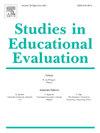基于外语写作中自我调节学习的在线同伴反馈培训:感知有用性和学生参与度
IF 2.6
2区 教育学
Q1 EDUCATION & EDUCATIONAL RESEARCH
引用次数: 0
摘要
同伴反馈在第二语言学术写作中至关重要。随着技术的进步,在线同伴反馈正在取代高等教育中的传统反馈方法。在本研究中,作者利用齐默尔曼的自我调节学习模型,旨在培训英语作为外语(EFL)的学生在一个学期内提供基于自我调节学习的在线同伴反馈。我们通过分析同伴收到的反馈以及他们如何回应反馈,探讨了英语作为外语的学生在提供和接收反馈时的参与度、他们对反馈的解释、他们在培训期间回应同伴反馈的后续行动,以及他们在自我调节写作策略方面的总体改进。数据来自对 20 名越南大学生所写论文的同伴反馈的分析。结果显示,反馈通常包括对语言细节的批评性和建设性意见,以及对内容的赞扬;学生优先考虑语法和词汇等本地语言方面的反馈,而不是整体内容和结构等方面的反馈。研究结果还表明,提供和接受在线同伴反馈能促进学习动机、对在线同伴反馈的积极态度、积极的学习环境、在自我调节学习的三个阶段中更多地使用写作和寻求同伴帮助的策略,以及自我改进策略和从同伴帮助中获得知识迁移,从而显著提高外语专业学生自我调节写作策略的使用。这些研究结果表明,基于自我调节学习的在线同伴反馈可以提高英语作为外语的学生的写作技能和策略性学习应用,为教学实践提供启示。本文章由计算机程序翻译,如有差异,请以英文原文为准。
Online peer feedback training based on self-regulated learning in english as a foreign language writing: Perceived usefulness and students’ engagement
Peer feedback is crucial in second language academic writing. As technology progresses, online peer feedback is replacing traditional feedback methods in tertiary education. In this study, wherein we utilized Zimmerman’s self-regulated learning model, the authors aimed to train English as a foreign language (EFL) students in providing self-regulated learning-based online peer feedback over one semester. We explored English as a foreign language students’ engagement in providing and receiving feedback, their interpretations, their follow-up actions in response to peer feedback during the training, and their overall perceived improvements in self-regulated writing strategies by analyzing the feedback that peers received and how they responded to that feedback. Data were collected from analyses of peer feedback on essays written by 20 Vietnamese university students. The results revealed that feedback typically includes critical and constructive remarks about language details, as well as praise for content; students prioritize feedback on local language aspects such as grammar and vocabulary over aspects such as global content and structure. The results also showed that providing and receiving online peer feedback significantly enhance English as a foreign language students’ self-regulated writing strategy use by fostering learning motivation, positive attitudes toward online peer feedback, a positive learning environment, and the increased use of writing and peer help-seeking strategies, as well as self-improvement strategies and knowledge transfers from peer assistance across the three phases of self-regulated learning. These findings suggest that self-regulated learning-based online peer feedback can enhance English as a foreign language students’ writing skills and strategic learning application, providing insights for instructional practice.
求助全文
通过发布文献求助,成功后即可免费获取论文全文。
去求助
来源期刊

Studies in Educational Evaluation
Multiple-
CiteScore
6.90
自引率
6.50%
发文量
90
审稿时长
62 days
期刊介绍:
Studies in Educational Evaluation publishes original reports of evaluation studies. Four types of articles are published by the journal: (a) Empirical evaluation studies representing evaluation practice in educational systems around the world; (b) Theoretical reflections and empirical studies related to issues involved in the evaluation of educational programs, educational institutions, educational personnel and student assessment; (c) Articles summarizing the state-of-the-art concerning specific topics in evaluation in general or in a particular country or group of countries; (d) Book reviews and brief abstracts of evaluation studies.
 求助内容:
求助内容: 应助结果提醒方式:
应助结果提醒方式:


